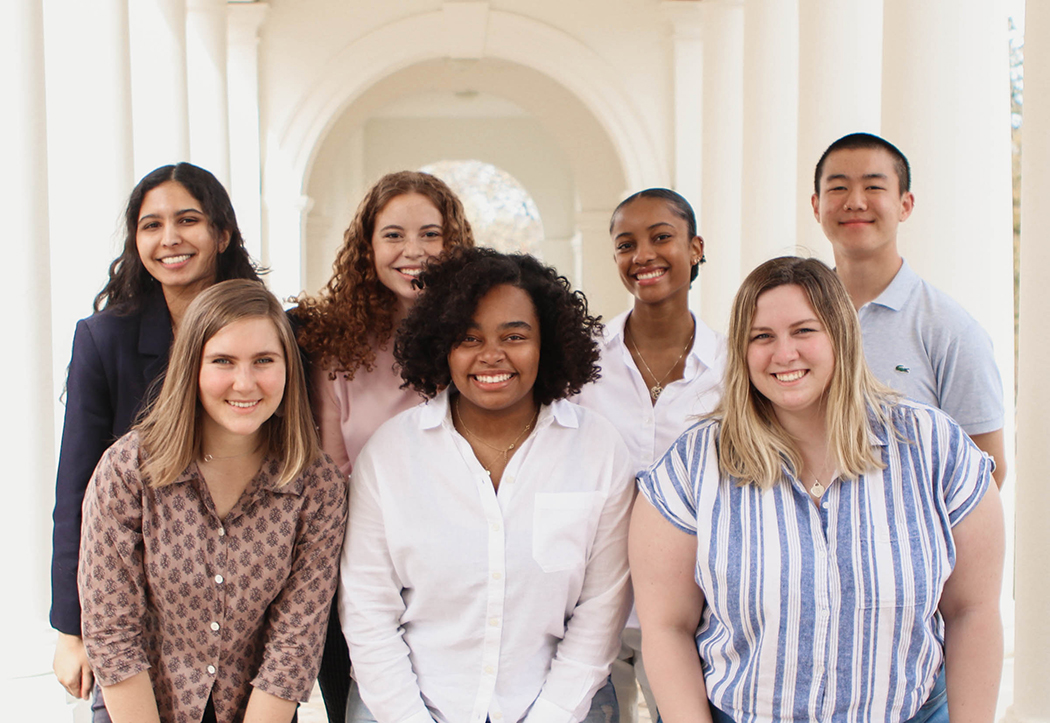In 1990, 12 percent of UVA’s students were Black. In the three decades since, that number has fallen, and now hovers around 6 percent. (The school doesn’t represent the state—19 percent of Virginia residents are Black.)
How did the university lose so many Black students? How can it increase Black enrollment? And how can it make sure Black students feel safe and included on Grounds?
These are just a few of the tough questions tackled in a new podcast, “Still We Rise,” created by a handful of UVA students as part of a larger oral history project called Reflections: Oral Histories. “Still We Rise”—a nod to Maya Angelou’s acclaimed poem—explores the legacy of racial injustice at UVA through thoughtful and provocative conversations with Black students, staff, faculty, alumni, and members of the Charlottesville community.
“We’re not looking so much at the era of slavery and segregation,” explains third-year Logan Botts, creator and manager of the podcast. “A place where we have a lot of ground to make up is what happened after Black students came to UVA. What has happened since integration? What is that culture and environment like? What can we do and what conversations do we need to have to make that better?”
Last year’s uprisings against police violence and systemic racism inspired Botts to start the podcast. She worked with her team at Reflections to secure financial support from UVA’s Democracy Initiative, allowing her to hire five students—almost all of color—to write, produce, and host each episode.
After a semester of research, interviews, and production, the students launched the podcast in early January, kicking it off with a two-episode discussion on the history of race in athletics and the role student-athletes play in social justice. The second pair of episodes, released in late February, examines UVA’s struggles to recruit and enroll more Black students, as well as the lack of safe, inclusive spaces for Black students on Grounds.
“There is a large percentage of the student body, faculty, and administrators who don’t know where to begin.”
Logan Botts, creator of “Still We Rise” podcast
“We pick topics that are at the forefront of the dialogue about UVA,” says Botts. “When you think about [UVA], athletics and academic rigor are some of the first things that come to mind. But we never talk about the racial history and context of those.”
The podcast’s next episodes will discuss student activism on Grounds, as well as the fraught relationship between UVA and the Charlottesville community.
“Student self governance is everything that they talk about here at UVA, but the notion of [it] lends itself to perpetuating some inequities, with students of color bearing the burden of doing a lot of activism work and advancing equity,” explains graduate student Victoria Nelson, one of the podcast’s hosts.
“We want to pay tribute to the work that’s being done [at UVA] and may not be recognized, particularly by racially marginalized students,” adds third year and co-host Pinay Jones.
Hard conversations about racial injustice are especially important at a place like UVA, founded by enslaver and rapist Thomas Jefferson, and built by an estimated 4,000 enslaved laborers. UVA did not admit a Black student until 1950 and did not fully integrate until well into the 1960s.
“There’s a rich, rich history of segregation and discrimination specifically against Black students and faculty,” says Nelson, who is Black. “We want to shed light on that, and want to situate ourselves in the present moment, paying tribute to what has happened in the past and how that has affected us today.”
In addition to highlighting the injustices endured by Black students, the podcast celebrates their many strides and accomplishments at UVA.
“[The Black experience] is very much a struggle and rooted in oppression…but there’s also this sense of community,” says Jones, who is Black. “We try to strike that balance between highlighting very real injustice…and the beauty that people have been able to construct out of their experience.”
While the team hopes the podcast attracts a variety of listeners, they especially want current UVA students to tune in, think critically, and take action.
“The people who care about the racial legacy are already talking about it. But there is a large percentage of the student body, faculty, and administrators who don’t know where to begin,” says Botts. “I want to create a place where you can come knowing nothing and leave knowing something—and potentially start a deeper journey into making UVA a better place.”
Students of color are strongly encouraged to submit their own stories through the Reflections website.
“[For] a lot of marginalized groups, especially Black people, our stories are told by other people,” says Jones. “So it feels good to be a part of a project where we are marginalized students, many of us Black, we’re telling the story, and drawing on other Black people who can tell their story in the moment.”
“Still We Rise” is free on Apple Podcasts, Spotify, and other podcast platforms.
